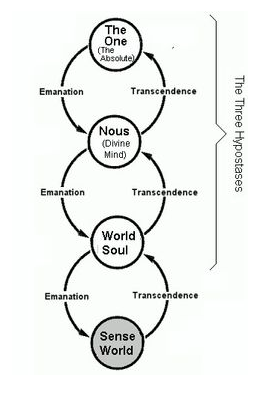Cosmos as Living Organism
For Plotinus as for other ancients, the cosmos was a living organism.
The One, or the nameless absolute, is reality when it is laid bare of every form. It is like the void that precedes all forms, all acts of creation. Yet the One is not nothing nor is it nothingness. It is life itself accessible, Plotinus averred, only through mystical vision.
The One’s first emanation, Nous, is what provides the cosmic blueprint for the many (see here David Fideler, Restoring the Soul of the World: Our Living Bond with Nature’s Intelligence). Next, the World Soul is an emanation of Nous. The World Soul is the site of eros; it is the “soul of the cosmos.” Finally, we discover the Sense World, or Nature, where space and time exist.
What’s important to underscore, here, is that this spiritual map is not meant to represent individual, disparate parts. Rather, the One is reality, and the One expresses itself in and through the creation of forms of the kind conceptualized as Nous, the World Soul, and the Sense World. And yet, the latter are, in truth, nothing other than the One; nothing other than that which participates in and cannot be understood as even remotely apart from the One.

Credit: Neoplatonism and Infinity
Relevance?
The first thing that is relevant to note is that the cosmos is One-All: it is unified, ordered, and total. In this sense, it differs considerably from the disenchanted world that you and I inhabit since, for us, it appears in our phenomenal experience as if the universe we vaguely know about through modern physics bears no genuine or intimate relation to homo sapiens. The universe is “out there” and we are irrevocably “in here.”
Secondly, the Plotinian cosmos is made of the same stuff that human beings are made of. It has Intelligence and we have intelligence. It has eros and we have eros. It has Sense Perceptions and we have sense perceptions. From a mystical perspective, then, it stands to see that we can transcend the limitations of being human should we denude ourselves of our own limited understandings: that we just are sense beings, that we just are intellectual beings, and so on. Thus, we can see how the upward assent in Plotinus is a path of transcendence. Like the Upanishads, therefore, Plotinus’s Enneads are really just pointers to our True Home.
Thirdly, it becomes clear through actual mystical experience that Infinity and Eternity just mean “outside of space” and “outside of time” but not “outside of (call it) ‘non-egoic experience.'” To be sure, about union with the One, one can say absolutely nothing since there is, when one is One, no separate witness or awarer of the nameless One-All.
*
It has been noted that Plotinus studied Indian philosophy. How wonderful to see how he synthesized Platonism with Indian philosophy! You can really see it here, and if you have a meditative practice, then you can take the above as nothing but one spiritual map (among others), this one intended for the Plotinian student eager to step foot on the path of introspection.
You must be logged in to post a comment.